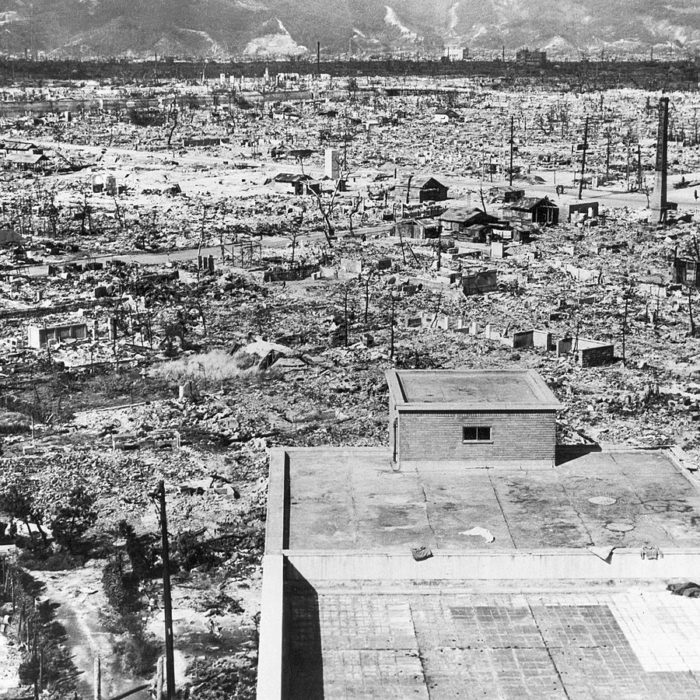Growing up I thought the strategy of mutually assured destruction, while tragic, kept the peace. Speaking to Nobel Peace Prize honoree ICAN member Seth Shelden, I learned that we’ve advanced from that line of thinking and our world changed to where it doesn’t apply any more.
As much as I’d like to hold on to something that made me feel comfortable or at least content, I have to drop believing that maintaining nuclear weapons keeps peace. Too many people can start wars.
ICAN—the International Campaign to Abolish Nuclear Weapons—led the UN to adopt the Treaty on the Prohibition of Nuclear Weapons (TPNW) by a vote of 122-1. The Treaty, when ratified, will prohibit the development, testing, production, manufacture, acquisition, possession, stockpiling, transfer, use, and threatened use of nuclear weapons or other nuclear explosive devices. Ratification requires 50 states. So far, 40 have ratified it, so they’re in the home stretch. EDIT: 43! Three ratified today.
Before talking to Seth I viewed them as tilting at windmills. Now I consider they’re work among the most important. I recommend learning more about them. Starting with his conversations on my podcast would work.
Here are pictures of one bomb on Hiroshima, tiny compared to today’s weapons.


Here’s a Red Cross video for perspective:
Here are more Red Cross videos.
Despite the emotional intensity of the videos if you clicked to see more, the issue for me is effectiveness. Banning nuclear weapons seems a matter of practicality based on reason. Continuing the path we’ve followed since the 40s seems emotionally relying on luck.
EDIT: After posting I pledged support for ICAN and felt the email I received worth sharing:
| Dear Joshua — My name is Setsuko Thurlow and I speak as a member of the family of Hibakusha – those of us who, by some miraculous chance, survived the atomic bombings of Hiroshima and Nagasaki. I want to thank you for joining 1,531 people in pledging to join us in the fight to ban and eliminate nuclear weapons. For 75 years, we have worked for the total abolition of nuclear weapons. As a 13-year-old schoolgirl, I witnessed my city of Hiroshima blinded by the flash, flattened by the hurricane-like blast, burned in the heat of 4000 degrees Celsius and contaminated by the radiation of one atomic bomb. A bright summer morning turned to dark twilight with smoke and dust rising in the mushroom cloud, dead and injured people covering the ground, begging desperately for water and receiving no medical care at all. The spreading firestorm and the foul stench of burnt flesh filled the air. Within that single flash of light, my beloved Hiroshima became a place of desolation, with heaps of rubble, skeletons and blackened corpses everywhere. Of a population of 360,000 — largely non-combatant women, children and elderly — most became victims of the indiscriminate massacre of the atomic bombing. As of now, 75 years later people are still dying from the delayed effects of an atomic bomb considered crude by today’s standard for mass destruction. As the 75th anniversary of bombings Hiroshima and Nagasaki approaches, this is the very time to solidify our partnerships to achieve nuclear disarmament, for make no mistake: the majority of the world’s people want to live in a world without nuclear weapons. And the majority also want to live in a world where the human rights of all people are celebrated, as we can see now across the globe as citizens rise up to confront systemic racism. Hibakusha understand the sting of discrimination all too well. We join with peaceful people everywhere, demanding change. The adoption of the Treaty on the Prohibition of Nuclear Weapons by 122 UN member states was a moment of great joy, marking the beginning of the end of the most horrific weapons ever made. With each state that signs and ratifies this extraordinary treaty, we move closer to our goal becoming a reality. Seventy-five years after that great crime against humanity we can see the glimmer of a new dawn — an era of peace built on stability, grounded in human rights, humanitarian law and secured through cooperation, not threats of global annihilation. Raise your voice with me and all Hibakusha who declare now is the time for all nations to join the nuclear ban treaty — to end the darkness of this era and welcome the sunrise on a new day through the force of law and the will of the people. We now have the opportunity to bring the treaty into force. We now have the opportunity to stop funding nuclear violence instead of funding human needs. We now have the opportunity to stop risking the life of future generations. Thank you for taking action and choosing to work with us to make this dream a reality. Setsuko Thurlow |
READ SETSUKO’S STORY |
